The Brownsteins in the Land of Israel
Chapter 25:
October 23, 2006
Before reading further, please click here and then here and then here: Thank you.
![]()
![]()
![]()
![]()
![]()
![]()
![]()
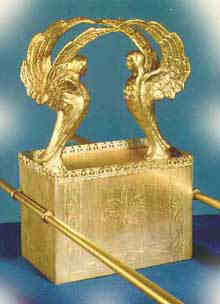 It
is written in the Bible that the Israelites carried the Holy Ark into battle
to give the Jewish nation an advantage. Ultimately, however, the Ark
was captured in battle by the Philistines. Seven months later, the Philistines returned the
Ark
because of a catastrophe brought down upon them since its capture: Specifically,
the Philistines had been afflicted en masse with hemorrhoids! After the Philistines concluded that their only hope for a cure was to
return the
Ark, they sent emissaries with the
Ark
and gifts––including a golden box filled with five small golden mice
(representing the five diminutive Philistine princes) and five golden
hemorrhoids.
It
is written in the Bible that the Israelites carried the Holy Ark into battle
to give the Jewish nation an advantage. Ultimately, however, the Ark
was captured in battle by the Philistines. Seven months later, the Philistines returned the
Ark
because of a catastrophe brought down upon them since its capture: Specifically,
the Philistines had been afflicted en masse with hemorrhoids! After the Philistines concluded that their only hope for a cure was to
return the
Ark, they sent emissaries with the
Ark
and gifts––including a golden box filled with five small golden mice
(representing the five diminutive Philistine princes) and five golden
hemorrhoids.
The Talmud (Shkalim 6:1) says that near the end of the First Temple, the Leviim hid the Ark in a secret chamber devised by King Solomon for that very purpose when he built the Temple. And what did the Jews include in the Ark that is still hidden away beneath the Temple Mount? They included both the unbroken and broken sets of 10 Commandments given to Moses on Mt. Sinai, the original Torah written by Moses, Aaron’s staff full of almond blossoms, a jar of manna, and, of all things, the gold box holding the gift of the Philistines.
And so it is today. Each time modern Lebanon allows terrorist organizations to attack modern Israel, the ultimate result has not been the destruction of the Zionist State, but instead catastrophe for Lebanon. Perhaps this time they will finally learn the lesson of the Philistines and will take responsibly for their borders and will be vigilant concerning those who put them in peril.
![]()
![]()
![]()
![]()
![]()
![]()
![]()
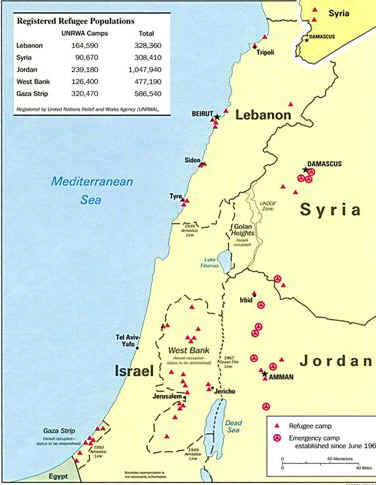 70,000
Palestinians––yes, s-e-v-e-n-t-y t-h-o-u-s-a-n-d p-e-o-p-l-e––live,
if you
70,000
Palestinians––yes, s-e-v-e-n-t-y t-h-o-u-s-a-n-d p-e-o-p-l-e––live,
if you
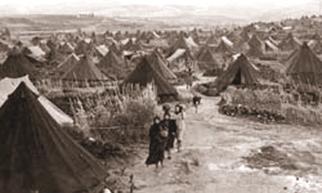 call it
that, in one particular refugee camp in one particular country. The camp is two square
kilometers. Demographers consider
500 people per square kilometer to be very densely populated; this camp holds 35,000 people per square
kilometer. The
refugees are not allowed to vote, practice medicine, teach, practice law, or
receive state social services. 400,000
Palestinians live in camps with the same identical inhumane laws throughout that
country. What country is it? Yes, Lebanon. And where did many southern
Lebanese relocate when the Israelis informed them that the Hezbollah strongholds
were going to be bombed? In
Palestinian refugee camps. Why? Because they knew that
Israel
would not bomb them. Yet Israel––where Palestinians freely vote, practice
medicine, teach, practice law, and
receive the exact same state social services that I do––evokes international
wrath for our human rights’ record.
call it
that, in one particular refugee camp in one particular country. The camp is two square
kilometers. Demographers consider
500 people per square kilometer to be very densely populated; this camp holds 35,000 people per square
kilometer. The
refugees are not allowed to vote, practice medicine, teach, practice law, or
receive state social services. 400,000
Palestinians live in camps with the same identical inhumane laws throughout that
country. What country is it? Yes, Lebanon. And where did many southern
Lebanese relocate when the Israelis informed them that the Hezbollah strongholds
were going to be bombed? In
Palestinian refugee camps. Why? Because they knew that
Israel
would not bomb them. Yet Israel––where Palestinians freely vote, practice
medicine, teach, practice law, and
receive the exact same state social services that I do––evokes international
wrath for our human rights’ record.
We live in a world where Arabs systematically keep their people in humiliating camps for generation after generation, forcing millions of people to live wasted lives that consist primarily of procreation, all in their leaders’ doomed, anachronistic, sadistic effort to destroy the State of Israel. At the same time, Israel has settled millions of Jewish refugees, sparing no cost, including airlifts from Ethiopia, Yemen, Iraq, and the Soviet Union/Russia from the 1950s until today.
Lebanese civilian deaths. A tragedy? Yes. But who is responsible? HonestReporting.com
noted: “It is, for example, 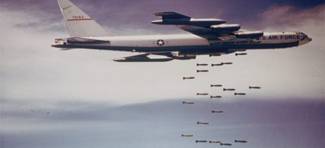 interesting
to examine the record
of NATO forces that bombed the Serb military in Kosovo
in the late-1990s. In the face of an
estimated 500 civilian deaths, NATO admits that: ‘Strikes were also complicated by the cynical Serb use of civilian homes and
buildings to hide weapons and vehicles, the intermixing of military vehicles
with civilian convoys and, sometimes, the use of human shields. In this way,
NATO’s concern to avoid civilian casualties was exploited by
the Serbs.’”
interesting
to examine the record
of NATO forces that bombed the Serb military in Kosovo
in the late-1990s. In the face of an
estimated 500 civilian deaths, NATO admits that: ‘Strikes were also complicated by the cynical Serb use of civilian homes and
buildings to hide weapons and vehicles, the intermixing of military vehicles
with civilian convoys and, sometimes, the use of human shields. In this way,
NATO’s concern to avoid civilian casualties was exploited by
the Serbs.’”
In 1982, 40,000
Lebanese were systematically killed by Syria. The world could not have cared
less; not a single country in the
international community blinked. And
forget about 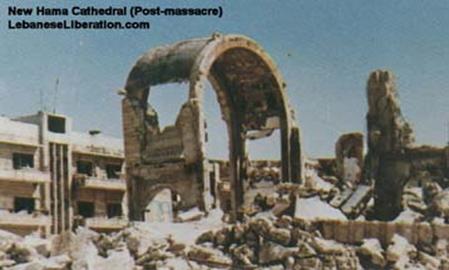 any
fuss from Amnesty International, Human Rights Watch, Doctors without Borders, the International Red
Cross, the Arab League, the United Nations.... Yet, when
any
fuss from Amnesty International, Human Rights Watch, Doctors without Borders, the International Red
Cross, the Arab League, the United Nations.... Yet, when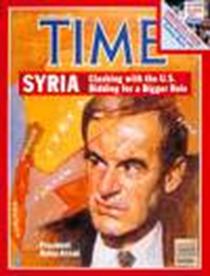
Oh, and this just in: It wasn’t 60 women and children killed in Kana in the air-raid; now the reports say that fewer than 30 people were killed in Kana. Further, the building came down eight hours after the air-raid, and a munitions dump was kept in that Kana apartment building. You don’t have to be Oliver Stone to figure out that Hezbollah prevented people from leaving the building after the Israelis warned that it was going to be destroyed. The evidence also suggests that bodies were actually added to the wreckage by Hezbollah. And I am confident that the building was finally brought down on the women and children by Hezbollah-lah-lah. I am not alone in this belief. Anti-Semitism has many incarnations, most of which are on vivid display at the drop of a hat on the world’s stage of the United Nations.
During the war, Ben Caspit,
one of Maariv’s leading columnists, wrote a speech
as if he were Prime Minister Olmert. He stated: “So today, here and now, I am putting an end to this parade of
hypocrisy. I don’t recall such a
wave of reaction in the face of the 100 citizens killed every single day in Iraq.
Sunnis kill Shiites who kill Sunnis, and all of them kill Americans––and the world remains
silent. And I am hard pressed to recall a similar reaction when the Russians
destroyed entire villages and burned down large cities in order to repress the
revolt in Chechnya. And when NATO bombed Kosovo for
almost three months and crushed the civilian population––then you also kept
silent. What is it about us, the Jews, the minority, the persecuted, that arouses this cosmic sense of justice in
you?” Ironically, many people are
circulating the entire, beautiful speech without noting that it was sadly not, in
fact, spoken by our Prime Minister. 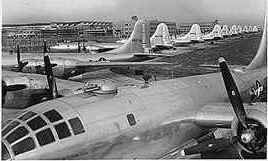
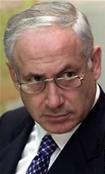
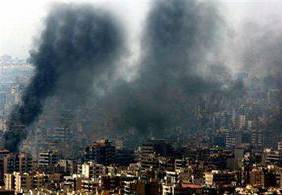
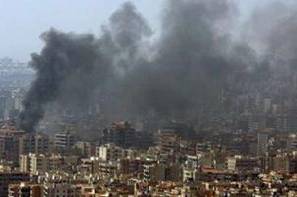 And
how about these photos of
Beirut? How do they look to you? At the risk of sounding like an optometrist, which one looks more
realistic: The first one on the left that features repetitive smoke and buildings superimposed
upon each other; or the second one on the left that is, uh, less distorted? Reuters published several anti-Israeli photographs that were doctored
during the war. The photo on the
left is so obviously doctored that a
blogger picked it up, busted Reuters and got their reluctant admission to a
supposedly inadvertent mistake, forcing Reuters to claim that the photo on the
right was the original. (This is not
only example of Reuters’ anti-Israel reporting historically.)
Many other examples
of doctored or posed photos turned up in the course of the war.
And
how about these photos of
Beirut? How do they look to you? At the risk of sounding like an optometrist, which one looks more
realistic: The first one on the left that features repetitive smoke and buildings superimposed
upon each other; or the second one on the left that is, uh, less distorted? Reuters published several anti-Israeli photographs that were doctored
during the war. The photo on the
left is so obviously doctored that a
blogger picked it up, busted Reuters and got their reluctant admission to a
supposedly inadvertent mistake, forcing Reuters to claim that the photo on the
right was the original. (This is not
only example of Reuters’ anti-Israel reporting historically.)
Many other examples
of doctored or posed photos turned up in the course of the war.
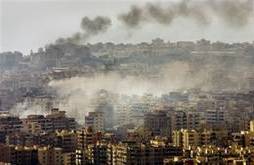 The only lesson here, from my perspective, is that the
supporters
of Israel
must always be vigilant in their skepticism of any reporting about Israel. By
it seems that the the
way, the actual original
photograph is to
the right!
The only lesson here, from my perspective, is that the
supporters
of Israel
must always be vigilant in their skepticism of any reporting about Israel. By
it seems that the the
way, the actual original
photograph is to
the right!

![]()
![]()
![]()
![]()
![]()
![]()
![]()
Many things were underestimated in this war, including
duration, intensity, and damage. But by far the most
unexpected result of the Hezbollah attack was to solidify the resolve and
unification of the Jews around the world, and particularly in the State of
Israel. Between 80%
and 95% of all Jewish Israelis continued to support heavy military action with
ground forces in southern
Lebanon
throughout the most of the war. Reservists
shipped out. Northerners hunkered down. And the rest of us gathered in. Israelis were willing to do
whatever was necessary to ensure that Hezbollah could never again threaten Israel
or Israelis. 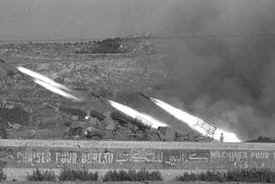
Yet Hezbollah, Syria, and Iran severely underestimated our resolve. They believed that the first rocket falling on Israeli soil, even in an open field, would bring us to our knees. Our enemies believed that we would turn over 10,000 terrorist prisoners in return for fingernail clippings from our captured soldiers. Moreover, the outside world never expected Israel to absorb thousands of rockets, let alone to be strengthened as a nation and a people because of it.
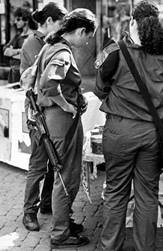 Two
weeks into the war on my way to synagogue I saw a teenage girl walking through
the park. She lives in the apartment
that abuts our synagogue. For
several years I had seen this girl emerging
Two
weeks into the war on my way to synagogue I saw a teenage girl walking through
the park. She lives in the apartment
that abuts our synagogue. For
several years I had seen this girl emerging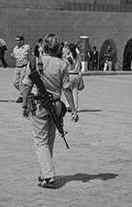 from the house and wondered what it was like to reside next to people praying
loudly three times a day. Was it invigorating? Annoying? Both? That day, as I had
before, I wished her, “Shabbat shalom” and continued on my way to morning
services. The next day I saw the
same girl, dressed all in army-green, burdened with a 40-pound backpack and an
M-16, being loaded by her mommy into the back seat of her family’s subcompact.
I thought of my 10-year-old little girl, Batya. I am sure that eight years ago this little
girl’s mommy never thought her
daughter would have actually had to serve in a war to defend
Israel. I am sure her mommy believed that
sooner or later the Arabs would give up. Almost
in tears, I told the little girl in green to keep safe, and then I walked away, wondering if the Arabs will ever leave us
alone.
from the house and wondered what it was like to reside next to people praying
loudly three times a day. Was it invigorating? Annoying? Both? That day, as I had
before, I wished her, “Shabbat shalom” and continued on my way to morning
services. The next day I saw the
same girl, dressed all in army-green, burdened with a 40-pound backpack and an
M-16, being loaded by her mommy into the back seat of her family’s subcompact.
I thought of my 10-year-old little girl, Batya. I am sure that eight years ago this little
girl’s mommy never thought her
daughter would have actually had to serve in a war to defend
Israel. I am sure her mommy believed that
sooner or later the Arabs would give up. Almost
in tears, I told the little girl in green to keep safe, and then I walked away, wondering if the Arabs will ever leave us
alone.
On a mission to take over and clean out buildings of terrorists’ nests in a Hezbollah stronghold, a certain unit commander was fighting while protecting one of his wounded soldiers. Suddenly, near a building, they were fired upon. The commander wanted to bring his soldier to a less exposed area, but the gunfire intensified. The officer attempted to return fire, but his weapon malfunctioned. One of two terrorists threw a grenade at the two Israeli soldiers. The commander, knowing that the lifespan of a grenade with a pulled pin is only 4.5 seconds, picked up the grenade that had fallen between his legs and threw it back, killing both terrorists and rescuing his soldier. (Newsweek also reported the story.)
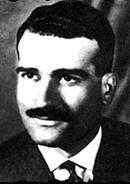 This
story about a brave Israeli commander rescuing his soldier is eerily evocative
of a story from
Israel’s
This
story about a brave Israeli commander rescuing his soldier is eerily evocative
of a story from
Israel’s 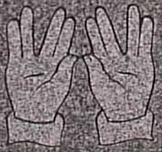 colorful past about a man named Eli
Cohen. In the 1960s Cohen served
as one of the greatest spies in Israeli history, integrating himself into the
Syrian political establishment and relaying bountiful and crucial intelligence
back to
Israel. Eventually Eli Cohen was caught by
the Syrians and hung in a public square in
Damascus. Despite countless pleas from his family, the Syrians have refused to return his
body, which, no doubt, had been
so badly desecrated that it is probably better that way. (I heartily recommend a thrilling book on the
subject, “Our Man in Damascus.”)
colorful past about a man named Eli
Cohen. In the 1960s Cohen served
as one of the greatest spies in Israeli history, integrating himself into the
Syrian political establishment and relaying bountiful and crucial intelligence
back to
Israel. Eventually Eli Cohen was caught by
the Syrians and hung in a public square in
Damascus. Despite countless pleas from his family, the Syrians have refused to return his
body, which, no doubt, had been
so badly desecrated that it is probably better that way. (I heartily recommend a thrilling book on the
subject, “Our Man in Damascus.”)
The commander in Lebanon who saved his soldier is also a Cohen, named Lieutenant Eli Kahn. This Cohen named Eli, who honored the deeds of our executed hero, is a boy from my shul, a boy who regularly blesses the congregation during Birkat Cohanim. On Shabbat, a few days before the incident, Eli’s father, told me that Eli had been fighting nose-to-nose up north. We are all very proud of and grateful to both Cohanim named Eli.
![]()
![]()
![]()
![]()
![]()
![]()
![]()
The week before the war, my
family and I were on a week-long vacation in the north of Israel. We toured
wineries, rafted down
the upper-Jordan River, and dined with friends in the open-air eateries of Nahariya.
 We
strolled through Tiberias. We took
the kids to Rosh Ha-Nikra to see the seaside caves and learn about this
place’s pivotal role during the Israeli War of Independence. I pointed out to the kids buoys in the
Mediterranean
a few hundred yards away that demarcate Israeli/Lebanese waters. We saw Israeli naval
patrols.
We
strolled through Tiberias. We took
the kids to Rosh Ha-Nikra to see the seaside caves and learn about this
place’s pivotal role during the Israeli War of Independence. I pointed out to the kids buoys in the
Mediterranean
a few hundred yards away that demarcate Israeli/Lebanese waters. We saw Israeli naval
patrols.
A week later, the parking lot at our Nahariya hotel was hit by a terrorist rocket––one of approximately 4, 500 fired into Israel during the war. That week, a friend and his wife and kids in Nahariya packed some belongings into plastic bags and became four of the half-million Israeli war refugees. Our friends camped at a Jerusalem home, wondering if theirs was still intact, having left a shelf partially built when fleeing.
We all know someone who felt the barrage of Katyushas. I know people in Tzfat who were ten meters away from an incoming round. (They then decided to join the other Israeli refugees further south.) We all know a dozen people whose sons were directly involved, whether taking over for troops sent to the front or directly on the front-line. The parents tell me they never thought that when their kids were the ages of mine such a thing would actually happen.
Every time we go north to the Golan, I think about the impossibility of giving away these mountains to the Syrians. But I felt a different awe when we visited Nahariya, a bustling seaside town packed to the gills with tourists and life before the war. Aside from taking for granted the invincibility and superiority of the Israeli military, so many people were shaken by the shattering of the myth that these national accomplishments could be threatened by random missiles. Nahariya was turned into a ghost town and is now slowly rebuilding.
![]()
![]()
![]()
![]()
![]()
![]()
![]()
![]()
![]()
![]()
![]()
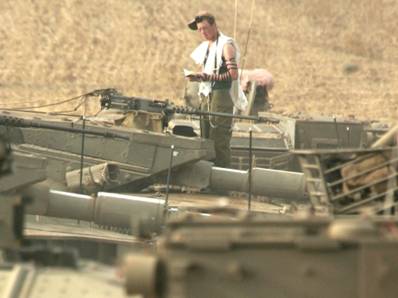 The
date on the Hebrew calendar of the outbreak of the war was the 17th
of Tamuz, a day of fasting in commemoration of the breaching of the walls of
Jerusalem, three weeks before the destruction of the Holy
Temple
by the Babylonians, about the time that the Holy Ark was secreted for our
future
Temple. The only day more ominous for a
war to commence would have been three weeks later, the 9th of Av. Most observant Jews could have expounded upon the portentousness of the
war starting on the 17th of Tamuz. It was terrifying.
The
date on the Hebrew calendar of the outbreak of the war was the 17th
of Tamuz, a day of fasting in commemoration of the breaching of the walls of
Jerusalem, three weeks before the destruction of the Holy
Temple
by the Babylonians, about the time that the Holy Ark was secreted for our
future
Temple. The only day more ominous for a
war to commence would have been three weeks later, the 9th of Av. Most observant Jews could have expounded upon the portentousness of the
war starting on the 17th of Tamuz. It was terrifying.
I was in Los Angeles
on the 17th of Tamuz. Being
in L.A.––driving on the freeways seeing
flatbeds hauling 60-year-old cars to movie sets––when my country was under
siege was gut-wrenching. I needed to
be with my family. I could not
return fast enough from the land of make-believe (not that I was going to pick
up an M-16 or make a real difference). A
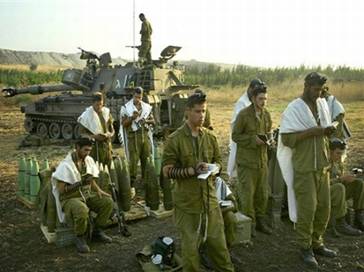 hundred
people who knew me seemed incredulous that I was in
La-La
Land
while the rockets were pounding our soil and homes. I must have stated a hundred times that my preference was to be at
home; another hundred times I assured friends that my family was fine, busy hosting
refugees; and another hundred times I said the only thing that people really
wanted to hear: That everything would be alright––as if I were their sole
(soul) connection to comfort, optimism, and Israel.
hundred
people who knew me seemed incredulous that I was in
La-La
Land
while the rockets were pounding our soil and homes. I must have stated a hundred times that my preference was to be at
home; another hundred times I assured friends that my family was fine, busy hosting
refugees; and another hundred times I said the only thing that people really
wanted to hear: That everything would be alright––as if I were their sole
(soul) connection to comfort, optimism, and Israel.
Just as in
Jerusalem, the same Tehillim (Psalms) were recited in all the LA. synagogues for our peace and
safety. But I felt as though people
were also praying for peace of mind in an utterly helpless situation. Truth be
told, I felt almost isolated during the recitation of Tehillim
in L.A. I longed to hear Tehillim recited
by the guys in my shul who could internalize the war-time nuance of every word, having driven tanks and endured existential threats for most of their
lives. I just wanted to be back home. 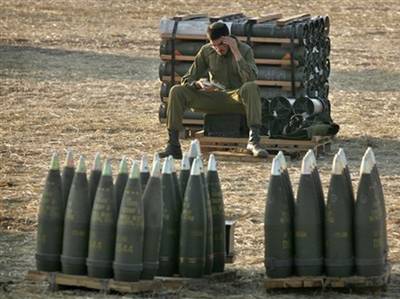
My Shabbat in L.A. was filled with anxiety. I made the mistake of not disabling the clock-radio-alarm, and was awoken by news from NPR that Tiberias had been hit by rockets. By then the shock of the Haifa attacks had started to subside, but who would have thought that peaceful Tiberias would be hit? How could You have allowed the place that houses the graves of Your favored children––Rabbi Akiva, Maimonides, Rabbi Meir, Yochanan ben Zakkai, Rabbi Chiya, etc.––to be targets? And You opened Your sky over the Meron resting place of Shimon bar Yochai and let the rockets fall there, too. Not to mention the pummeling You have allowed in Tzfat, shaking the graves of, among others, Yossef Karo and the Arizal. Having been to each of these tombs, sensing the greatness emanating from all, I can only conclude that we must have really messed up.
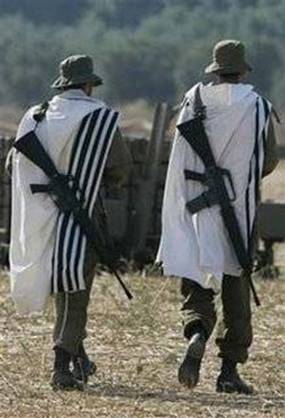 The
day continued to degenerate in the scorching 100-degree heat. I heard a rabbi quoting me anonymously to his
congregation, belittling my
suggestion (made in an offhand conversation with him) that our current problems
are being correctly addressed by our brave soldiers and substantial security
barrier. I had not thought it
necessary to add, when speaking to a rabbi, that none of it makes any difference
without emuna (faith), tefilla (prayer), and mitzvot (observance). It would be like discussing the finer points of painting without
mentioning the need to purchase brushes, canvas, and paint. I didn’t think I needed to stress the
obvious, but I was apparently wrong.
The
day continued to degenerate in the scorching 100-degree heat. I heard a rabbi quoting me anonymously to his
congregation, belittling my
suggestion (made in an offhand conversation with him) that our current problems
are being correctly addressed by our brave soldiers and substantial security
barrier. I had not thought it
necessary to add, when speaking to a rabbi, that none of it makes any difference
without emuna (faith), tefilla (prayer), and mitzvot (observance). It would be like discussing the finer points of painting without
mentioning the need to purchase brushes, canvas, and paint. I didn’t think I needed to stress the
obvious, but I was apparently wrong.
I also came to understand the helplessness of Diaspora Jewry when Israel is in peril. And I tried to understand the difference between their helplessness and our practicality, albeit uneasy practicality. We have our Tehillim and we have our mitzvot. We have our emuna and we have our tefilla. But we also have an army, air force, navy, and commandos. We have our brave boys and girls, men and women, mothers and fathers, all knowing what to do and what is needed on the ground and in the synagogue. Of course Jews feel helpless 10,000 miles away! But in Israel, when you’re driving down the freeway, and in the opposite direction is an Israeli-made tank on a flatbed-semi headed to the front, or when you see Israeli jets screaming through the skies at impossible angles, or when you bump into 18-year-old kids in khakis who are schlepping machine guns; at that point the notion of helplessness morphs into action. Indeed, we pray that the Almighty will shine His countenance on our actions and that we are deserving of having our actions succeed for the greater nation of Israel. In the Diaspora, “helpless” is a common syndrome; in Israel, helpless has not been an option since the Holocaust.
![]()
![]()
![]()
![]()
![]()
![]()
![]()
As if he were Gandhi, UN
obermeister Kofi Annan’s mantra during the war was that Israel
had used non-proportional force and should have unilaterally halted hostilities.
I wondered how Annan
quantifies what is appropriate force in relation to the targeting of thousands
of rockets trained on civilian populations. 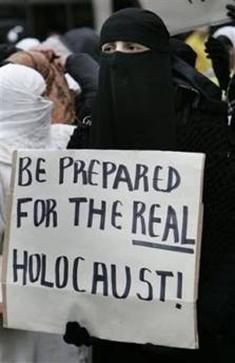 Annan and the Arabs wanted a return to status
quo. Israel
and the
United States refused. Annan wanted to turn back
the clock to allow terrorists with no legitimate territorial claims against Israel
to return to
Southern Lebanon
with their 13,000 rockets aimed at our cities. At least the Palestinians can piece together somewhat of a territorial
claim for their unabated acts of terror. But Hezbollah? They are recalcitrant in
their goals of terror and extermination.
Annan and the Arabs wanted a return to status
quo. Israel
and the
United States refused. Annan wanted to turn back
the clock to allow terrorists with no legitimate territorial claims against Israel
to return to
Southern Lebanon
with their 13,000 rockets aimed at our cities. At least the Palestinians can piece together somewhat of a territorial
claim for their unabated acts of terror. But Hezbollah? They are recalcitrant in
their goals of terror and extermination.
To get a fix on the true aims
of Hezbollah chief Nasrallah, one need only read
his overwrought apology for one of his rockets. Instead of killing more Jewish
children, it mistakenly killed two Arab
boys in Nazareth, apparently sending them into eternal martyrdom with 70 virgins:
“To the family that was hit in
Nazareth––on my behalf and my brothers’, I apologize to this
family,” he said. “At any event, those who were killed in Nazareth, we consider them martyrs for
Palestine
and martyrs
for the nation. I pay my condolences
to them.” Nasrallah’s apology
was idiotic propaganda and completely disingenuous, considering that his
favorite target, Haifa, is one-third Arab. Nasrallah just
wanted to kill Jews and harm Israel, regardless of the number of Arabs who “accidentally” became his collateral
damage. And, in fact, several
non-Jewish Israelis were killed by Nasrallah’s near-random rockets. (One Arab family who lost a child had a photo of
Egypt’s Gamal Abdel
Nasser hanging on their destroyed living room wall.)
martyrs
for the nation. I pay my condolences
to them.” Nasrallah’s apology
was idiotic propaganda and completely disingenuous, considering that his
favorite target, Haifa, is one-third Arab. Nasrallah just
wanted to kill Jews and harm Israel, regardless of the number of Arabs who “accidentally” became his collateral
damage. And, in fact, several
non-Jewish Israelis were killed by Nasrallah’s near-random rockets. (One Arab family who lost a child had a photo of
Egypt’s Gamal Abdel
Nasser hanging on their destroyed living room wall.)
The poor people of Lebanon, by allowing Hezbollah into the Lebanese government, made their bed, just like their brothers in Gaza and the West Bank did with Hamas. As governments composed of genocidal organizations, now both the Lebanese and Palestinians must sleep with their poor decisions. If this means lying awake due to the pounding of Israeli ordnance, perhaps they will think twice the next time they choose their leaders. In the meantime, to quote The Rolling Stones, there’s no sympathy for the devil.
The upside to Hezbollah’s
gasp to justify its existence is that it completely deflected attention from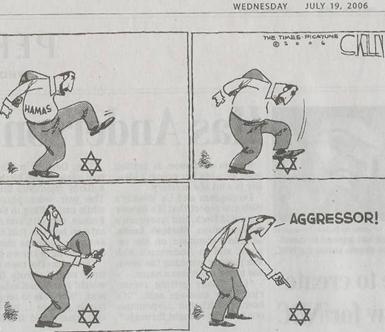
And just for the record, I still believe that Disengagement was in Israel’s best interests, despite the loud chorus of pessimists who mistakenly blame Disengagement for Hamas’ victory in the Palestinian elections and for emboldening the Palestinians into rocket attacks. Virtually no one disagrees that Hamas was elected because Palestinians were tired of Fatah’s notorious corruption; the fact that these people have received more aid per capita than any people in history yet live in abject poverty was cited again and again for Hamas’ rise to power. And surely no one believes that the Kassam missiles would have stopped had we stayed in Gaza. I tell you, sure as day follows night, that the only difference between now and Gaza without Disengagement is that we would have had to defend 8,000 vulnerable civilians in much closer proximity to the rockets. In fact, that is an understatement: We would also have hundreds of civilian dead and scores of military casualties defending the settlers, and would have built no political capital in the world to spend on The Barrier. Was Disengagement handled properly? No, it was a debacle. Many people are still not properly resettled or properly compensated. But I still believe it had to be done.
![]()
![]()
![]()
![]()
![]()
![]()
![]()
Now that the Hezbollah war is over, many of my American friends keep asking about Israeli reaction to the war? Not that I am Caroline Glick or Charles Krauthammer, but here is my take.
That the operation had to be conducted sooner or later in Lebanon is not in dispute. How long would America tolerate Mexico lobbing random salvos into San Diego, ambushing soldiers, and taking American hostages? It has been widely expressed in comparison to our situation here that if such a situation occurred on an American border, no American president (except Jimmy Carter) would hesitate to flatten Tijuana, just as an hors d’śuvre.

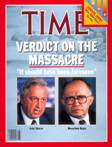 But
it seems to me that Hezbollah picked a battle with the wrong prime minister and
defense minister. Both Ehud Olmert
and Amir Peretz, unlike the generals whom they replaced, had a lot to prove in
the war, mostly in showing that they are every bit the commander that Sharon was.
Ironically, the ground
invasion that we witnessed, by many accounts, may not have been as extensive as
it was (or even may not even had been launched altogether) by the previous
government, headed by Ariel Sharon, who had been branded an international war
criminal for not preventing a Christian massacre of Palestinians after the
Israeli attack on the PLO in Lebanon in 1981.
But
it seems to me that Hezbollah picked a battle with the wrong prime minister and
defense minister. Both Ehud Olmert
and Amir Peretz, unlike the generals whom they replaced, had a lot to prove in
the war, mostly in showing that they are every bit the commander that Sharon was.
Ironically, the ground
invasion that we witnessed, by many accounts, may not have been as extensive as
it was (or even may not even had been launched altogether) by the previous
government, headed by Ariel Sharon, who had been branded an international war
criminal for not preventing a Christian massacre of Palestinians after the
Israeli attack on the PLO in Lebanon in 1981.
Olmert and particularly
Peretz, in their daily rants, were nothing less than obnoxious in their
fist-slamming approach explaining how we were going to be victorious in all
aspect of the war, as if this were the World Wresting Federation and they were
the tag-team of the Zionist Zealots. Although
Peretz attempted to shake his image as a no-holds-barred labor union leader
whose only goal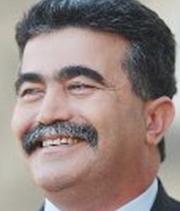
 was
making this country pay for rejecting socialism, Peretz appeared more like a
campy cartoon character, not as a national leader, and certainly not as a
defense minister. His detailing of
how he was going to pulverize the enemy was counter-productive, embarrassing and,
frankly, quite shameful. I
think we all would have appreciated a little less Rambo-driven smack from Peretz,
and a little more circumspection.
was
making this country pay for rejecting socialism, Peretz appeared more like a
campy cartoon character, not as a national leader, and certainly not as a
defense minister. His detailing of
how he was going to pulverize the enemy was counter-productive, embarrassing and,
frankly, quite shameful. I
think we all would have appreciated a little less Rambo-driven smack from Peretz,
and a little more circumspection.
By the end of the war, “pulverize” became “teach them a lesson” and then became “contain
them”. Talk about a moving target; Peretz’s threats could not have been hit by the finest
sharpshooter. And, in the end, Peretz did not destroy Hezbollah; he did not gain the
freedom of our kidnapped soldiers; he did not carry out the threats to level
Beirut if Haifa were hit; he did not prevent arms from coming in from Syria; he
did not  reduce
the number of rockets that fell daily on northern Israel; he did not elevate
Israel’s standing in the world; and we watched the destruction of about a
million trees in our precious forests by 450 rocket-ignited fires––trees that
will take 50 years to replace. At
least Michael Jordan and Alan Iverson knew not to talk trash unless they were
certain to prevail. Unfortunately
for Peretz, the war revealed him to be exactly what we all believed: An
uneducated, political animal with nothing but ambition coursing through his
veins. By all rights, with his
public approval rating in the low teens, Peretz will be out of government within
a few months, finally left to be decapitated by his own ravenous Labor Party.
reduce
the number of rockets that fell daily on northern Israel; he did not elevate
Israel’s standing in the world; and we watched the destruction of about a
million trees in our precious forests by 450 rocket-ignited fires––trees that
will take 50 years to replace. At
least Michael Jordan and Alan Iverson knew not to talk trash unless they were
certain to prevail. Unfortunately
for Peretz, the war revealed him to be exactly what we all believed: An
uneducated, political animal with nothing but ambition coursing through his
veins. By all rights, with his
public approval rating in the low teens, Peretz will be out of government within
a few months, finally left to be decapitated by his own ravenous Labor Party.
Ironically, Prime Minister
Olmert’s hide was saved by, of all people, Sheik Hassan Nasrallah,  when,
just after the
when,
just after the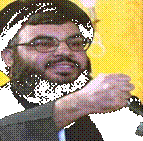 war,
he announced, “If
I had known that the operation to capture the soldiers would lead to this result,
we would not have carried it out.” That suggests Hezbollah now recognizes
that Israel may retaliate asymmetrically to any further incursions or attacks and
that, therefore, Hezbollah will be reluctant to risk another attack. I find no other way to read that
quote. So, to complete the circle, if the goal of the war was to eliminate
further attacks from
Lebanon, if the goal was to make the sovereign government of
Lebanon
take responsibility for the South, if the goal was to make it clear that any
further attacks will result in Israeli aggression against a sovereign Lebanon, Olmert
succeeded. Whether you like
Olmert––which I do not––it is difficult, if not impossible, to deny that
at least he has accomplished one significant strategic victory for Israel
in what will probably be a very short tenure as prime minister.
war,
he announced, “If
I had known that the operation to capture the soldiers would lead to this result,
we would not have carried it out.” That suggests Hezbollah now recognizes
that Israel may retaliate asymmetrically to any further incursions or attacks and
that, therefore, Hezbollah will be reluctant to risk another attack. I find no other way to read that
quote. So, to complete the circle, if the goal of the war was to eliminate
further attacks from
Lebanon, if the goal was to make the sovereign government of
Lebanon
take responsibility for the South, if the goal was to make it clear that any
further attacks will result in Israeli aggression against a sovereign Lebanon, Olmert
succeeded. Whether you like
Olmert––which I do not––it is difficult, if not impossible, to deny that
at least he has accomplished one significant strategic victory for Israel
in what will probably be a very short tenure as prime minister.
Once the hostilities ended, there was, predictably, the entire spectrum of
criticism. Why were ground troops
not sent in sooner? Why were ground
troops used at all, instead of simply carpet bombing? Why did we fire off only
40,000 rounds of artillery into southern Lebanon
instead of 60,000 or 80,000 rounds? Why
didn’t we finish off Hezbollah? Why
did we deal with the symptom (Hezbollah) instead of the cause (Syria)? Why does anyone believe that the
United Nations will do anything more now to hinder Hezbollah than they did
before the 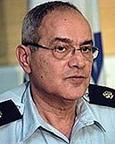 war?
What happened to the reservists’ readiness and equipment? Why did troops have to search for potable
water? Why did we allow Bush and Rice to call the shots? Why didn’t we accept a
ceasefire two days
earlier, which would have
saved 40 Israeli lives? Why did we
accept a ceasefire at all? And much
of anger was directed at the perceived lack of direction in the war, a lack of
consistent planning or even a plan.
war?
What happened to the reservists’ readiness and equipment? Why did troops have to search for potable
water? Why did we allow Bush and Rice to call the shots? Why didn’t we accept a
ceasefire two days
earlier, which would have
saved 40 Israeli lives? Why did we
accept a ceasefire at all? And much
of anger was directed at the perceived lack of direction in the war, a lack of
consistent planning or even a plan.
No wonder the war-time 95% unity of Jewish Israelis has precipitously evaporated.
For the most part, those who would have advocated more force, and particularly more ground troops, probably would not have been able to stomach the loss of hundreds, instead of dozens, of Israeli soldiers; and the international community would not have tolerated the appearance of significant collateral damage; and Hezbollah would have had even more success with portraying Israel that the overbearing monster; and the United States would not have been able to hold off a ceasefire for over a month. And those who advocated less force would not have been happy after the war with Hezbollah infrastructure still in-place, especially up to the Israeli border, and with the Syrian border crossings intact. But ultimately, Israelis who complain about “too little force” or “too short” or “no direction from the leadership”, when faced with the finite options that existed at the start of the war, will fall back to the real, core issue that has disturbed all of us: The pathetic state of our vaunted reservists. Every year this country spends billions of shekels pulling people from the workforce to train in the reserves. Although the reservists fought bravely and honored this country, the lack of proper planning and appropriate equipment now makes it seem that some of the billions spent on reservists was squandered. The bright side is that many of the lessons of Lebanon are being implemented in Gaza. Further, now, at least, we can see exactly how many new clothes the emperor is actually wearing, so we can fit him with appropriate attire.
Commissions have been set up
and are now learning from the failures. This
process will be long and painful and very productive. Much of the criticism has been heaped upon Chief of Staff Dan
Halutz, who
seemingly did not have a coherent plan. As
we drive past the Supreme Court building in
Jerusalem, there are still protesters camped out calling for the resignations of
Halutz, Defense Minister Peretz, and Prime Minister Olmert. 


Of course, not liberating our captives in exchange for a ceasefire is amongst the biggest failures. While there is every hope that Gilad Shalit, who was captured in Gaza, will be returned at some point, I doubt that the two soldiers kidnapped on the northern border––Ehud Goldwasser and Eldad Regev––will be returned anytime soon. And, again, we must count on German mediators to negotiate their release. (Indeed, sadly, we may end up having to exchange 1,000 terrorists for each of our soldiers.)
 As we just passed the 20th
anniversary of the capture of Israeli navigator Ron
Arad, it should be clear that this is an example needing maximum tefillot
and emuna. To spend even 30 seconds
thinking about what these four soldiers’ daily lives may be like is as close
to torture as I would ever want to come. Likewise, I shudder to think what their families are going
through.
As we just passed the 20th
anniversary of the capture of Israeli navigator Ron
Arad, it should be clear that this is an example needing maximum tefillot
and emuna. To spend even 30 seconds
thinking about what these four soldiers’ daily lives may be like is as close
to torture as I would ever want to come. Likewise, I shudder to think what their families are going
through.
Do I believe that Hezbollah will rearm? Yes and no. Do I think that they will have the free hand that the Lebanese government and United Nations’ troops gave them before the war? No. But they will, most definitely, build up whatever arsenal is needed in order to further their aims. Yet pinpointing their aims, aside from the destruction of Israel, is a more esoteric task. If their goal is to grow politically within the Lebanese government, Hezbollah could find that rearming with the types of weapons used against Israel will be counterproductive. On the other hand, Hezbollah needs to show a game face, especially to their constituents in southern Lebanon. They cannot appear to have been intimidated or shattered by the Israeli military response, a response that destroyed virtually the entire Hezbollah infrastructure that had been built since Israel left Lebanon in 2000. Much of that infrastructure, including bunkers, tunnels, storehouses, and weapons, especially those which abutted the Israeli border, will be almost impossible to re-create under the noses of the UN and Israeli reconnaissance.
In the end, however, it is a
political question having less to do with Hezbollah, yet more to do with a
sovereign State of Lebanon. The
question that needs to be asked is why
Syria, which has much more extensive rocketry and artillery than Hezbollah, does not
launch rockets into
Israel. The obvious answer is that they
know the consequences would be devastating, threatening the weak regime of Bashar
Assad. And now that a sovereign Lebanon has taken responsibility for southern Lebanon,
with Hezbollah politicians in the government, with the world watching, and
knowing that Israel will hold
![]()
![]()
![]()
![]()
![]()
![]()
![]()
My proofreaders have been
adamant that I am far too optimistic for my own good. They feel that I should stop believing that our enemies will ever come to
grips with the existence of the State of Israel or, for that matter, the Jewish
people. It is these friends’
belief that I should take off my rose -colored
glasses and take a good,
-colored
glasses and take a good, 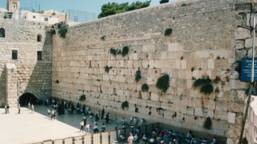 hard look at the
hard look at the
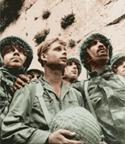 ocean of hatred directed at my people from around the
globe. Ironically, my biggest critics are those who know me best, who know that
my emuna in these matters was bred and cultivated long ago in a town called
“The Rose City,” in a green place called Oregon, where “liberal” and “hopeful” are not a matter of style, but a way of
life. And although the same
implacability is the hallmark of the anti-Zionists and anti-Semites who wish to
“wipe us off the map,” I cannot change my core beliefs based upon the
corrupt ideals of others. My new home, the City of
ocean of hatred directed at my people from around the
globe. Ironically, my biggest critics are those who know me best, who know that
my emuna in these matters was bred and cultivated long ago in a town called
“The Rose City,” in a green place called Oregon, where “liberal” and “hopeful” are not a matter of style, but a way of
life. And although the same
implacability is the hallmark of the anti-Zionists and anti-Semites who wish to
“wipe us off the map,” I cannot change my core beliefs based upon the
corrupt ideals of others. My new home, the City of
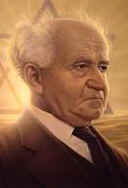 “In
Israel, in order to be a realist you must believe in miracles.”
“In
Israel, in order to be a realist you must believe in miracles.”
Israel's Founding Prime Minister
Anyway, thanks for reading this far.
I appreciate and look forward to your comments and greetings.
As you know, we are in the middle of a membership drive, so please get me the e-mail addresses of people whom you want to add. (Let them know ahead of time, so I don’t get in trouble with the spam police).
Please stay tuned for Chapter 26: "Farewell to a Friend."
All the best,
Rich Brownstein
PO Box 8130
91081 Jerusalem
ISRAEL
Phone: (310) 597-4230 (Free From America)
Phone: 011-972-2-6733-491
CURRENT DISTRIBUTION: 2222 worldwide
NOTE:
If you want to add someone to this list, or remove yourself (or multiple addresses I have for you), just e-mail rich@brownsteins. net.